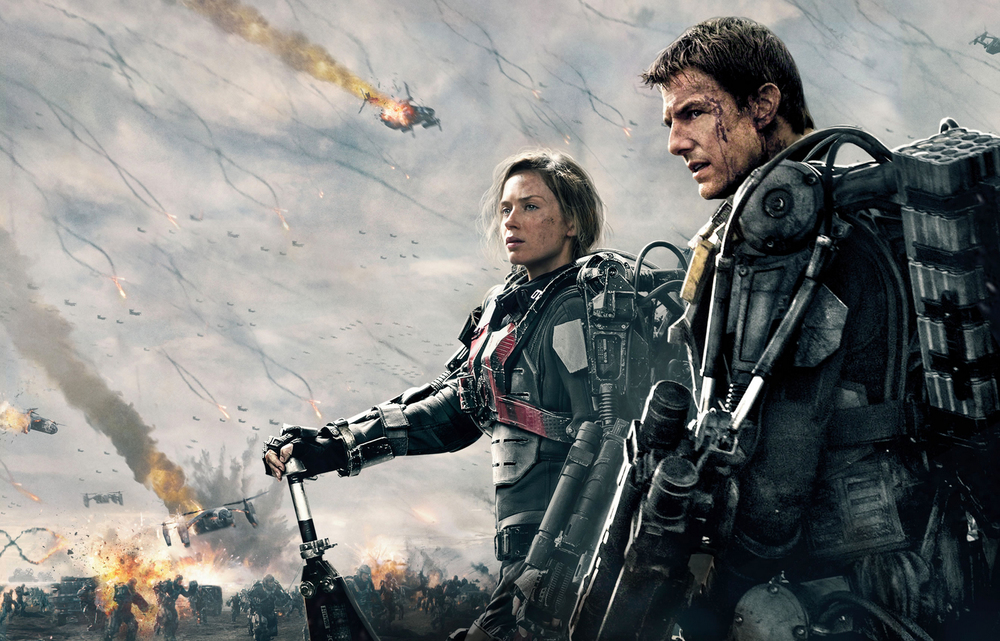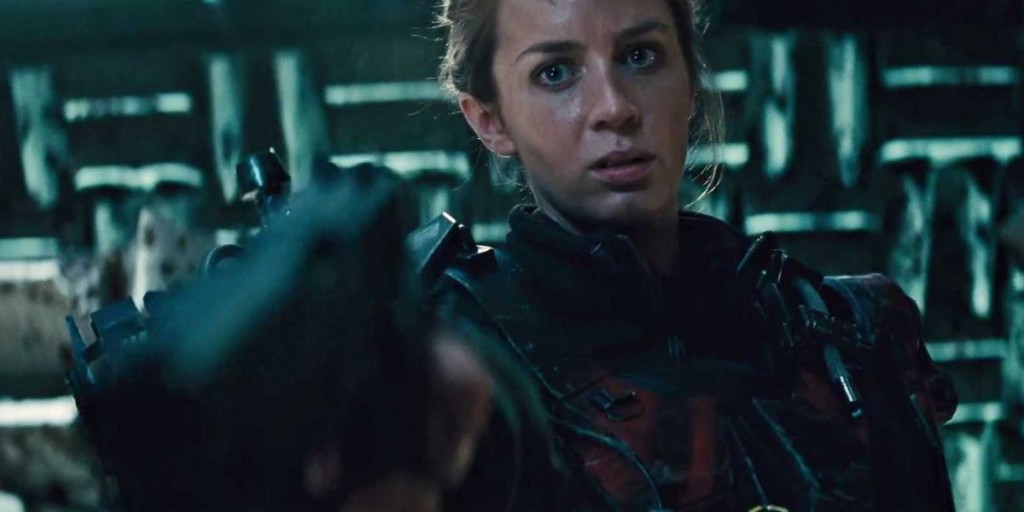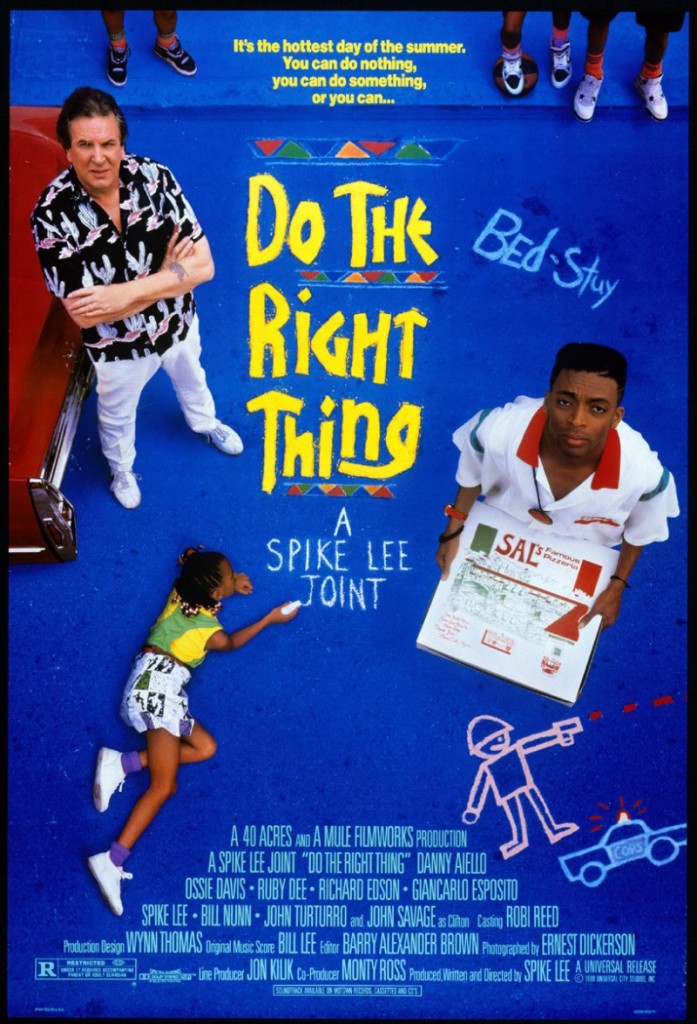Genre: Sci-fi
Premise: A soldier defending the earth from aliens finds himself reliving the last day of an impossible-to-win battle over and over again. Eventually, he begins to use this power to improve his fighting skills, in hopes of doing the unthinkable, leading his army to victory.
About: Maybe someone can clear this up for me. Does screenwriter D W Harper exist? An internet search brings up scant details (repped at CAA – he’s written a few in-development projects around town). Whenever a no-name comes out of nowhere and writes a script this good, my Spidey senses start tingling. A big writer known for another genre using an alias maybe? Furthermore, Harper, who scripted the draft of this script that sold for a million bucks (then titled “All You Need Is Kill”) is no longer in the credits for the film. Instead, Christopher McQuarrie leads the writing credit pack. For an idea this unique, you’d think that the original writer would obtain some credit, but I suppose not. Expanding the mystery, “Harper” has been chosen by Ridley Scott to script his dream sci-fi project, Forever War. So I don’t know what’s going on. But anyway, this is the original draft that sold and got everyone excited, before any writers came on to do rewrites. The film is directed by Doug Liman (The Bourne Identity), stars Tom Cruise and Emily Blunt, and comes out this June.
Writer: D W Harper (based on the novel “All You Need Is Kill” by Hiroshi Sakurazaka)
Details: 1st draft (4/1/2010)
I honestly didn’t think they’d ever make this movie. The action described on the page was unlike anything I’d seen before. One guy is fighting like hundreds of aliens at once. Repeatedly. I’m no visual effects artist, but each word I read felt like one of those Fourth of July sparklers. Except instead of sparkles, there were dollar signs shooting out. Maybe they’re funding this thing with bitcoins? I don’t know.
It also seemed a little over-concepty for Hollywood. A movie about aliens attacking earth is common. A time travel movie is common. But this script went ahead and bundled the two together. Typically when I run into scripts like this, or try and push scripts like this up the ladder, producers say the same thing – “There’s too much going on here.”
But All You Need Is Kill is a testament to how good writing can overcome this complaint. Simply put, if you write something good, it doesn’t matter if it breaks rules.
20 year old Cage (believe it or not, this is the role Cruise will play, no doubt rewritten) is a grunt soldier in a future where aliens have invaded earth and are systematically taking down continents one by one. They’ve destroyed all of North America, leaving Cage and the rest of his army to try and hold South America.
But Cage’s regiment is kinda fucked. When they go out to fight (in a battle known as “The Battle of Ruby Tuesday”), they get smoked by an alien force that mysteriously seems to know where they’re going to be before they do. As such, Cage and his army are slaughtered. That’s right, our hero dies within the first 15 minutes of the film!
Sora of. Seconds later Cage wakes up. He realizes it’s the day before the battle. Was what he just experienced a vivid dream? No. Cage finds himself living the exact same day over again, right up until the battle, where he and his group get slaughtered again. This keeps happening every day. For some reason, poor Cage is stuck in a loop.
The only thing Cage looks forward to is watching fellow soldier Rita (aka “Valkyrie One”), a recluse badass, rip hundreds of aliens to pieces every battle, even while all the soldiers around her die quick deaths. How is it, Cage wonders, that Rita is so much stronger than everyone else?
Cage finally gets the courage to hike over to Rita’s place before the battle, and over the course of many reboots, tells her his story, that he’s looping. She informs him that she’s also a looper, but has been doing so for way longer than him. Happy to have someone who understands her, Rita befriends Cage and starts training him. Together, they become an unstoppable force on the battlefield.
But what does winning the battle matter if they just keep looping back to the beginning? The two will have to figure out how to stop the loop, a process that involves killing the aliens that may have inadvertently given them the power to loop in the first place.
First off, if you write action scripts and you can get a hold of this script, read it. This is one of the best scripts as far as action-writing I’ve read.
Almost all the lines in the battles are two lines or less. Harper uses capitalizing to great effect to help key us in on important images (i.e. “TENS OF THOUSANDS OF OTHER JACKETED INFANTRY”). Harper uses iso-description to keep our eyes moving down the page. This means isolating action or subjects via a single line…
UP THE BEACH
IN THE SKY
OUT TO SEA
The writing favors flow over heavy description, yet still manages to pack a lot of information in it (“Worse yet, TWO MIMIC RUNNERS have detached and GIVE CHASE. YONABURU FIRES, taking one down, but the other is closing in.”). That’s one of the hardest things to do in sci-fi and fantasy. Your world is so unique that you can’t help but try and describe it all. But describe too much, and your action gets bogged down, which is the exact opposite of what you want to do with action. Harper has mastered this balance.
The script plays around with convention too. How bout meeting your man character, only to have him die within the first scene? Or how bout the “meet-cute” scene between our leads. Rita comes over as Cage is dying on the battlefield and tries to help him? Nope. She tells him she’s going to let him die here and then steals his battle-gear battery. Sounds like Harper got that meet-brute idea from a little screenwriting book I know.
I actually wanted to talk about the love story here because after watching the trailers for the film, I can see that they’ve changed it. In the script, Cage watches Rita from afar the whole time. She’s this unapproachable superstar fighting badass. She’s unattainable. A dream. It isn’t until the last 40 pages or so that the two start interacting.
Now normally I don’t like this. The traditional approach is to have your leads meet by the end of the first act at the latest (and in rare circumstances, by page 45), and then play around with their relationship over the rest of the story (guy gets girl, guy loses girl, or girl gets guy, girl loses guy, they get together again, lose each other again, you get the idea). But with All You Need Is Kill, the whole time looping element made that approach irrelevant. There was enough going on that we didn’t need to jump into the romantic relationship right away.
However, it appears that the studio didn’t agree with this approach and they’ve had the two get together a lot earlier. I understand why they did this. They want their male and female leads around each other. They want interaction. And to be honest, doing it the way they do it now would make me nervous too. Because it’s different. And nobody in this business likes to be too different. Actually, that’s not true. They like “different” in a spec because they’re tired of seeing the same old thing. But they haven’t invested 300 million dollars in a spec. So when actual money gets involved, they start worrying about all these “differences” and tend to mold the script back into something more traditional. This is often why good scripts become bad movies. Fear.
So I’m guessing that’s one of the things McQuarrie was asked to do. Move the timeline of the love story up. Have them get together earlier. And probably spend more time on that relationship in the film.
It looks like they also brought in an outside storyline. In the script, everything’s pretty contained. We’re either in the barracks or on the battlefield. Everything takes place in these two locations. In the trailer, there seems to be some government interference. We’re driving outside on roads, getting chased. There’s none of that here.
My guess is that the studio also got worried about the “too contained” aspect. When you’re plopping a film down in the middle of summer, it’s got to feel as big as possible. And even though the battlefield scenes look great in “Kill,” adding more locations gives the movie a “bigger” feel. It gives the studio more variety in the imagery, which they can use in the promotion.
I don’t know if that’s why they added that storyline or not, but that’s what it feels like to me.
All You Need Is Kill is one of these new breeds of spec sales where producers know how weary studios are of buying naked properties (spec scripts not adapted from anything). So they offer them a property that IS based on something, just not anything popular, to sort of trick them. This way, both sides win. Writer gets to sell his spec script and the studio gets to say they bought intellectual property.
What does that mean for writers who are writing naked specs? Simple, you just have to write something better. You have to write something awesome enough that people are willing to take a chance on you despite your script not be affiliated with IP.
All You Need Is Kill is one of my favorite spec scripts and is always flirting with my Top 25. A lot of people have this script so with some asking around and/or Google searching, you should be able to find it.
[ ] what the hell did I just read?
[ ] wasn’t for me
[ ] worth the read
[x] impressive
[ ] genius
What I learned: Remember, suspense is the act of suspending an event. If you have your hero look inside a room, you can show the audience what’s in that room a second later, or you can wait a few scenes until the hero brings his friends back. THEN show us what’s in the room. By suspending the event, you’re keeping us curious. That’s what Harper does here with Valkyrie One (Rita). We see her from afar but never meet her. Harper SUSPENDS the eventual meeting between Cage and Rita because he knows how much we want to see it. Whenever you’re writing a scene, ask yourself, “Is there anything here I can suspend?”
If you search Google for movies with the best dialogue, you get a lot of familiar hits. Writers like Woody Allen, Quentin Tarantino, Richard Linklater, Charlie Kaufman, John Hughes and Aaron Sorkin. Some of these writers thrive on realism (Linklater), others on flash (Tarantino), but all of them have the gift of making you pay attention when one of their characters speaks. It’s an invaluable talent, and therefore quite frustrating if you’re born without it. As I’ve said before, I don’t think mediocre dialogue writers can ever become great dialogue writers. But I think mediocre dialogue writers can become good dialogue writers with a hell of a lot of work. It’s a matter of understanding the basics (come late into a scene, your characters shouldn’t speak “on the nose”) then putting your characters in the best position to say interesting things. That’s what too many writers overlook. They try to write great dialogue out of nothing, when great dialogue typically comes out of setting up the situation beforehand. Today’s script marked the arrival of an incredible new talent, Spike Lee. One thing everybody agreed on was that Lee hit out of the park with the dialogue in this script. I couldn’t agree more. Try watching this movie and turning away. Every time someone speaks, you want to hear what they have to say. Why? What magic potion is Lee using? No magic. Just tried-and-true dialogue-writing methods. In fact, even the naturalism in Lee’s dialogue is born out of an easy-to-learn lesson. I do want to highlight a couple of non-dialogue tips here too, but dialogue will be the focus. Let’s begin!
1) The power of character differences – Sometimes all you have to do to write great dialogue is put two different people in a scene and have them talk to each other. Use differences in age, differences in race, differences in political views, differences in class. That’s what gives Do the Right Thing so much of its great dialogue. The different races always see the world differently, which is what leads to all these conflict-heavy entertaining conversations.
2) Choose stories that hide your writing weaknesses just like you choose clothes that hide your body weaknesses – This is self-explanatory yet a lot of writers make this mistake. If you’re a flashy dialogue writer, write a movie that’s heavy on dialogue. If you’re not, avoid scripts like Do the Right Thing like the plague. Good writing can be as simple as staying away from the things you’re bad at.
3) Another way to develop character – My big takeaway from this script is that character development isn’t always about a character changing. It’s about a writer revealing more about that character over time to create the illusion of change. The drunk old man looks like a loser at first. But the more we learn about him, the more we like him. He even saves a kid from a speeding car later. So he doesn’t change as a person. But he changes in our eyes because we know more about him now than we did at first.
4) Add fuel to the conflict fire whenever possible – Remember, most great dialogue results from conflict. So you should look for any way to stoke that conflict. This script already has a ton of conflict because of all the racism. But Lee adds the WEATHER to make it even worse. In Do the Right Thing, it’s the hottest day of the year. People have less patience in hot weather. They’re more easily agitated. A simple argument can escalate quickly. Which is exactly what happens.
5) In One-Day stories, the weather can become a character – I realized that if your script takes place over one day, the weather can become a major character in your story. Here, it’s the heat. But in another movie, it can be the coldest day of the year. Or the rainiest. Or the day of a huge blizzard. When you have a movie that takes place over this short a period of time, pay attention to the weather, as the right weather choice can have a huge impact on the story.
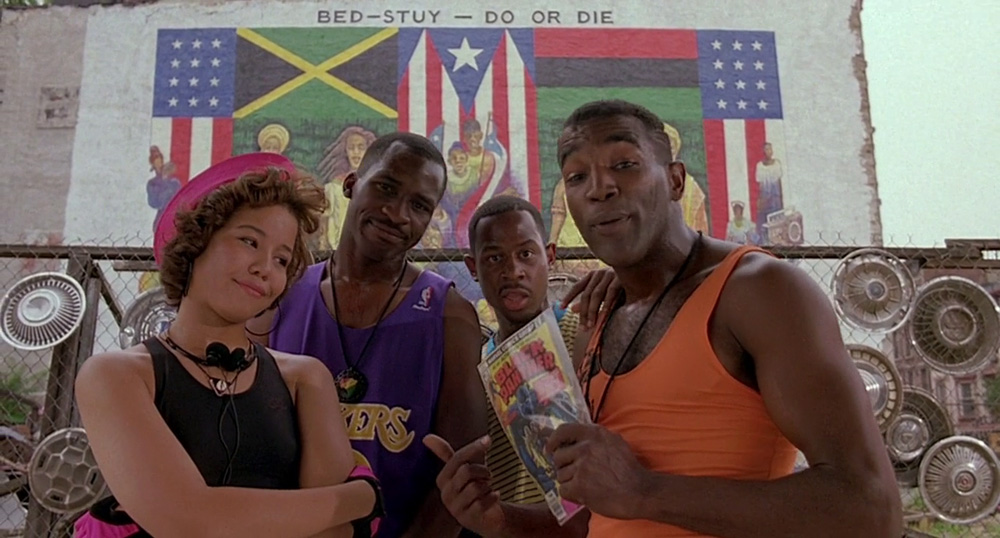
6) People on the same side don’t always agree – Even characters on the same side should disagree about things. Don’t assume that just because Sal and his son work together at Sal’s Pizza that they’ll have the same views about everything that’s happening. What I liked about Lee’s script is that Sal was respectful of others, whereas his son was racist. Sal wanted to help people. His son wanted them to help themselves. This lead to conversations between the two that were way more interesting (“Maybe we should get rid of this place, Dad.”) than if these two thought the same way. Remember, not every scene can be two people with hatred towards one another yelling for five minutes. Conflict has to live within your groups, not just outside of them.
7) Easiest way to write dialogue is to write what you know – Lee grew up with all these characters in his neighborhood. That’s why they all feel so real. Whatever people you grew up with, particularly the eccentric and most memorable, make sure you’re writing those people into your scripts. They’ll write the dialogue for you. Never underestimate the power of this simple tip (this is the “naturalism” tip I was referring to in the intro).
8) Theme allows for “pointless” dialogue – Here’s the thing with dialogue. Its main purpose is to push the story forward. The thing is, real life dialogue, the kind that’s free-flowing and crazy and fun to write, doesn’t push anything forward. It’s just people talking. Which means each time you write dialogue, you’re trying to write an oxymoron. The reason Lee’s dialogue is so good in “Thing” is because a lot of it isn’t pushing the story forward. It’s dialogue of the free-flowing crazy variety. So how is he able to get away with it? Easy. Lee has a strong theme in his film – racial tension in the city. When you write with a strong theme and keep the dialogue focused on that theme, you can get away with “rambling” dialogue, because the dialogue still feels relevant. What does four guys yelling at a man for stepping on his shoe have to do with the plot? Nothing. But the man who owns the shoe is black. And the man who stepped on the shoe is white. Therefore, this “pointless” dialogue-heavy scene feels relevant because this whole movie is about racial tension.
9) Variety in characters leads to better dialogue – One of the best things about Lee’s script is how different all the characters are. We have a weird radio carrying guy (Radio Raheem), we have an old drunk man, a man with a lisp, the mentally retarded guy, the African Pride Radio announcer, the troublemaking crew, the old “complainer” guys across the street. The more variety you have in your characters, the more interesting their conversations are going to be. Period.
10) As always, look for unique ways to evolve old phrases – This is where you really see the pros stand out. They take old well-known phrases and turn them into something we haven’t heard before. Sal doesn’t say, “I should kick your ass” to Mookie. He says, “If you were just a little bit taller, I’d kick you in the ass for what you’re thinking.”
BONUS TIP) Evolve phrases by utilizing character specifics – Notice how the above phrase is focused on Mookie’s height: “If you were just a little bit taller.” Lee uses this specific trait of Mookie’s to inspire Sal’s change of the line. It’s easy for you to do the same. For example, if you’re writing a rom-com where a woman is asking our main character (who’s a lawyer) how he knows some important piece of information, his reply might be, “I’d tell you but I’d have to kill you,” But everyone uses that line. So look at your options. What’s specific about our character? He’s a lawyer, right? So maybe the response is, “I’d tell you but I’d have to bill you.” That’s admittedly lame but you get the idea!
***NOTE: MONDAY REVIEW IS BELOW!***
***NOTE: AMATEUR OFFERINGS POST IS UP – SCROLL DOWN!***
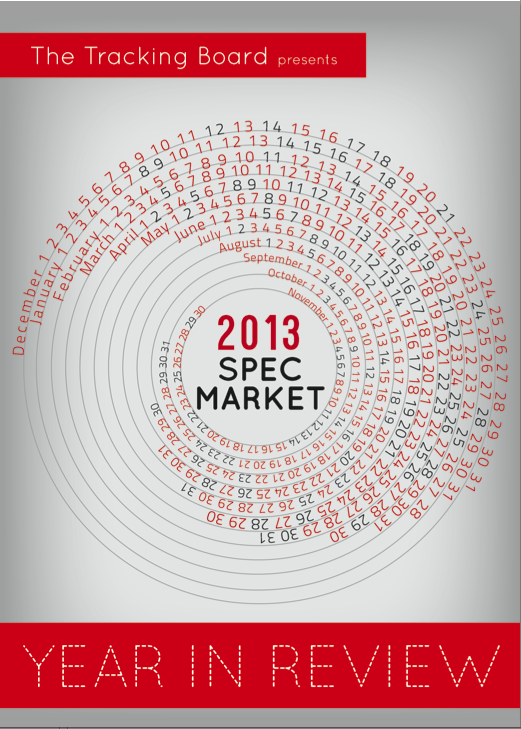
Hey guys, wanted to divert your attention to something really cool. My friends over at The Tracking Board just came out with a full 300 page book tracking all the spec scripts from last year. Not only that, but the book goes into which managers sold the most scripts, which agents, which studios bought the most scripts, which genres were the highest sellers. If you want to know what’s selling, who’s repping what, and who’s buying, you need to download this book now. The best part about it is it’s FREE.
Also, for those of you who aren’t yet members of The Tracking Board, they’ve agreed to give a 25% discount to all Scriptshadow readers, bringing the yearly membership down to $59.25. Here, you’ll be able to get all this information in real time, allowing you to track trends, and more importantly, figure out who’s selling and buying what, so you can target your query letters to the agents and producers who make the kinds of movies you write. This is the site I use every day to track the industry. So I highly recommend it. The offer is good through Sunday!
Genre: Dystopian/Sci-fi
Premise: (from IMDB) In a world divided by factions based on virtues, Tris learns she’s Divergent and won’t fit in. When she discovers a plot to destroy Divergents, Tris and the mysterious Four must find out what makes Divergents dangerous before it’s too late.
About: The next attempt at a YA novel franchise debuted this weekend to about 55 million dollars. It wasn’t quite Hunger Games numbers, but it’s probably enough to ensure a full trilogy. Divergent was adapted by Evan Daugherty, who broke out a few years back with a screenplay contest win that eventually led to a 7 figure sale and ended with the hit film, Snow White and the Huntsman. Possibly because Kristin Stewart starred in that film, the godmother of the female-driven YA franchise, the Divergent folk brought Daugherty in to script another success story. Coming in to give the script some female sensibility was Vanessa Taylor, who wrote the Meryl Streep film, Hope Springs.
Writer: Evan Daugherty and Vanessa Taylor (based on the novel by Veronica Roth)
Details: 139 minutes!
When you invest in a franchise these days, you don’t have any choice but to cram it down the world’s throat. So competitive has this business become, that it’s better to blanket the world with advertisements and make them HATE your movie, than display a respectful number of billboards and remind everyone that you exist. Hate is irrelevant. What’s important is that they KNOW.
Divergent is the latest film to get the “blanket your eyeballs” marketing treatment. And it’s unfortunate. Cause I’m one of these people who’s been wishing for the death of the female-driven YA novel franchise. I shall not fib. I came to Divergent ready to split the movie in two and send the halves back to the literary world, where they would remain hidden inside the minds of whoever picked them up. But that didn’t happen. My reaction is more…divergent than expected.
The “Divergent for Dummies” plot breakdown goes something like this. It’s Chicago at some point in the future, after war has decimated the world. In order to make sure this doesn’t happen again, the good people of Chi-Town have divided their population into five factions. These factions have names, but they’re way too complicated for the sake of this review. So we’ll just call them the Borings, the Smarties, the Exercisers, and two others that are irrelevant to the plot.
Tris is our hero. She’s part of the Borings, the unofficial ruling group of the city. Her life is dedicated to doing boring things like helping others. But her Choosing Moment is coming up, where she chooses the faction she’ll join for the rest of her life. Why someone is born into a faction but has to choose a faction is beyond me. But that’s this world for ya.
Luckily, it gets more complicated. Before you choose, you get tested to find out which faction you’re a part of. After you find out, you’re supposed to choose that faction. But you don’t have to. You can still choose any faction you want. Which begs the question – why the hell do they need this test in the first place?
It probably has something to do with what happens during Tris’s test. Tris isn’t picked for ANY of the factions. She’s a DIVERGENT! Which is a huge no-no in this society because Divergents can’t be controlled. Luckily, the tester decides to keep this a secret. So Tris is safe. For now at least.
I say “for now” because Evil Kate Winslet, a part of the Smarties Faction, is set on rooting out all the Divergents and killing them. To think, it was only a few years ago she was flying with Jack on the front of the Titanic.
In a surprise move, Tris joins the Exercisers on Choosing Day, who are known for NEVER WALKING. The Exercisers are the chosen defenders of the city, which means Tris has decided to train and become a soldier.
Towards the end of her training, Tris learns of a plan by the Smarties to take over the city, killing the only faction standing in their way, the Borings. The worst part? The Smarties are going to use mind-control on the Exercisers to do their dirty work. The irony! Tris’s current faction is going to kill her old faction! Ah but remember, Tris is immune to mind-control. She’s a Divergent. The question is, is that enough to thwart this plan and save the city?
If you should ever stumble into a showing of Divergent, you may feel like you’re in an alternate dimension. Soon after you sit down, you’ll be bombarded with a dozen scenes of the Exerciser Faction running around, smiling, high-fiving, jumping, cheering, all to an annoyingly catchy tribal beat. It’s one of the weirder things you’ll ever experience in a theater.
But here’s why Divergent survives the nuclear bomb that sent it to its dystopian reality in the first place. This story is almost exclusively focused on character development, and it does a pretty good job of it. Tris is confused about her place in the world, not unlike all of us after our institutionalized years, and therefore must find herself. She joins a faction where she’s the underdog, and that choice is the main reason why this script works.
Like I’ve told you guys in the past, an underdog character goes a long way. And Tris is so far down this ladder (everyone tells her she’s toast – she’ll never make it through the training) that you can’t help but root for her. I loved how they made the odds so impossible (always make your odds impossible!) that you’re never sure if she’s going to succeed or not.
Now because this movie was about character development, much of it is Tris being challenged, having to overcome her fears and her flaws. The problem was, they got a little carried away with that. I wasn’t counting, but 70-80 minutes of Divergent is dedicated to training. I kept waiting for a more concrete story goal to emerge (a danger outside the city they would have to battle perhaps?). But that never came. So I wondered where this was all going.
When I realized this wasn’t The Hunger Games, with its big fancy goal of the Games at the end, but about a secret uprising, I found myself fascinated by the choice. Because it’s the much more dangerous choice of the two. With The Hunger Games, your audience is always looking forward to that juicy goal of trying to win the games.
Divergent’s plot is happening underneath the surface, not unlike The Shawshank Redemption, where the main plot is being kept from the audience. The reason that’s a dangerous move is because it’s easier for the audience to lose interest. If they can’t see the endgame, what’s motivating them to stay interested? Audiences usually need that clear finale (those “Hunger Games” if you will) to stay committed. Think about it. If I told you we were going to your favorite restaurant at the end of the day, your whole day would be great. You’d be so excited for later. If there was no restaurant visit, however, your day would feel kind of boring. There’d be nothing special about it.
This finally helped me realize why the trailers felt so confusing – why every time I saw them I didn’t know what the movie was about. They couldn’t reveal what the movie was about because the whole plot is the third-act twist! It’s the secret uprising plot that was invisible for 2 hours.
Did this work? Sort of. The twist itself was kind of cheesy. We have serum-centric mind control going on, and whenever you throw in serum-centric mind control, I’m sorry, but it’s going to be cheesy. The thing was, you liked Tris so much, you wanted to see her win. You wanted to see her take down Evil Kate Winslet.
I give it to the Divergent writers for keeping the plot focused, despite its long run time and all the weird things they had to include from the novel. The training was long, but they constantly reminded us how important it was. That’s what you have to remember when it comes to adaptations. The writers have to find ways to make things work even though they know they don’t work. If you’re lucky, someone will be paying you to do that some day.
I mean why the hell does this Exerciser Faction never walk? Why are they always cheering? And the biggest question of all – WHY THE HELL DOES THE TRAIN IN CHICAGO NEVER STOP??? There’s no way to get on the train in this movie unless you run and jump on it.
You’d think that one of the many engineers in the city would figure out a way to solve this problem (I hear brakes still work in the future). It was weird stuff like this that gave Divergent a schizophrenic feel. But Daugherty and Taylor found a way to include just enough of it to sell the world, but not so much that we rolled our eyes (well, okay, I rolled my eyes a couple of times).
Did Divergent benefit from extremely low expectations? Yes. Am I recommending you all go out and see it? No. But if you’re walking around on a Saturday afternoon with nothing to do and you can get a matinee ticket, you may find Divergent not nearly as bad as you’d expect it to be.
[ ] what the hell did I just see?
[ ] wasn’t for me
[x] worth the price of a matinee ticket
[ ] impressive
[ ] genius
What I learned: There should always be a sense of doubt that your main character will succeed. If there isn’t, why would we care? There would be nothing to worry about.
This is your chance to discuss the week’s amateur scripts, offered originally in the Scriptshadow newsletter. The primary goal for this discussion is to find out which script(s) is the best candidate for a future Amateur Friday review. The secondary goal is to keep things positive in the comments with constructive criticism.
Below are the scripts up for review, along with the download links. Want to receive the scripts early? Head over to the Contact page, e-mail us, and “Opt In” to the newsletter.
Happy reading!
TITLE: AESOP THE COURAGEOUS
GENRE: Adventure
LOGLINE: When his mother is kidnapped and sold into slavery, the legendary fableist must overcome being a short, ugly mute and outmatch Greek philosophers and bloodthirsty kings to rescue her and save the kingdom.
WHY YOU SHOULD READ: If I have to sit through another movie starring a chisel chinned, barrel chested, cooler-than-christ anti-hero, I’m gonna start drinking. And when I drink, I get all existential. And when I get all existential, I go searching for myself. And when I go searching for myself, I take trips to exotic countries. And when I take trips to exotic countries, my planes mysteriously disappear. And when my planes mysteriously disappear, I end up on Lost island. As cool as that would be for about a week, please don’t let me end up on Lost island, Carson! For a change, let’s give the short and uglies of the world a chance at being heroic. And you can start right here with this inspired, true-ish tale.
I’ve always been intrigued by ancient Greek culture and stumbled upon this story in college. It is tailor-made for the big screen, but very few people know about the man behind the fables. A cute, straight forward fantasy adventure this is not. Think more along the lines of the dark and dirty original versions of the Grimm Brothers’ fairy tales. The Zemeckis’, Burtons, and Depps of the world would have a field day with this.
TITLE: The Disappearance of Flight 229
GENRE: Drama / Thriller
LOGLINE: A grieving father will stop at nothing to uncover the truth when his family goes missing in an airline disappearance.
WHY YOU SHOULD READ: I’ve placed in just about every competition out there and am looking to take it to the next level. I first wrote this script a few years back and it has recently become a timely topic in the world today, so I thought I’d throw it out there again.
TITLE: Eve
GENRE: Sci-fi/Comedy
LOGLINE: In a future where the government chooses your spouse for you, a group of married friends rebel by starting an underground sex club.
WHY YOU SHOULD READ: Imagine a world without war or racism, without adultery or hurt feelings, depression or diseases… oh yeah, and no sex, either. Your Friends (the people in power) choose your job and spouse for you. When they think the time is right, they deliver a baby to you via drone. Everyone takes a vitamin each morning that helps them remain perfectly content. Eve fits right into this world… but one day she stops taking her vitamin and discovers everything that she never knew she was missing.
TITLE: From the Wild.pdf)
GENRE: Mystery/Drama
LOGLINE: After a massive wildfire, a small Oregon town starts to experience strange occurrences that could end up altering modern science forever.
WHY YOU SHOULD READ: This script was the first time I’ve ever really written from my heart, and it’s inspired by the Spielberg films I love. I entered it in the most recent script contest on trackingb.com but it didn’t place anything. I wasn’t expecting much. It was the first time I’ve submitted anything to anywhere. Still, I like the script and hope to get some great feedback from the vast amounts of screenwriting knowledge that frequent Scriptshadow. Tear it apart!
TITLE: Doggone
GENRE: Dramedy
LOGLINE: A suicidal man’s plan to off himself is thwarted by a stray dog.
WHY YOU SHOULD READ: I’ve been writing two years, and well, I’m probably the most unlikely to succeed in this business, but I love writing(maybe I’m somewhat masochistic)! This is a buddy-dog story. Coverage readers have given it a consider. It found me an agent the first year I began writing(yes, I recklessly sent out old fashioned queries before the script was ready). My cowriter/best friend, could’ve killed me for doing such! Anyway, it’s been optioned(once) and the first-time director recently backed out, so I’d love to give it some sort of shot in the dark. I figure if anyone could give it a shot… Carson could! :) So why not? Hell, it’s got a damn DOG in it!

